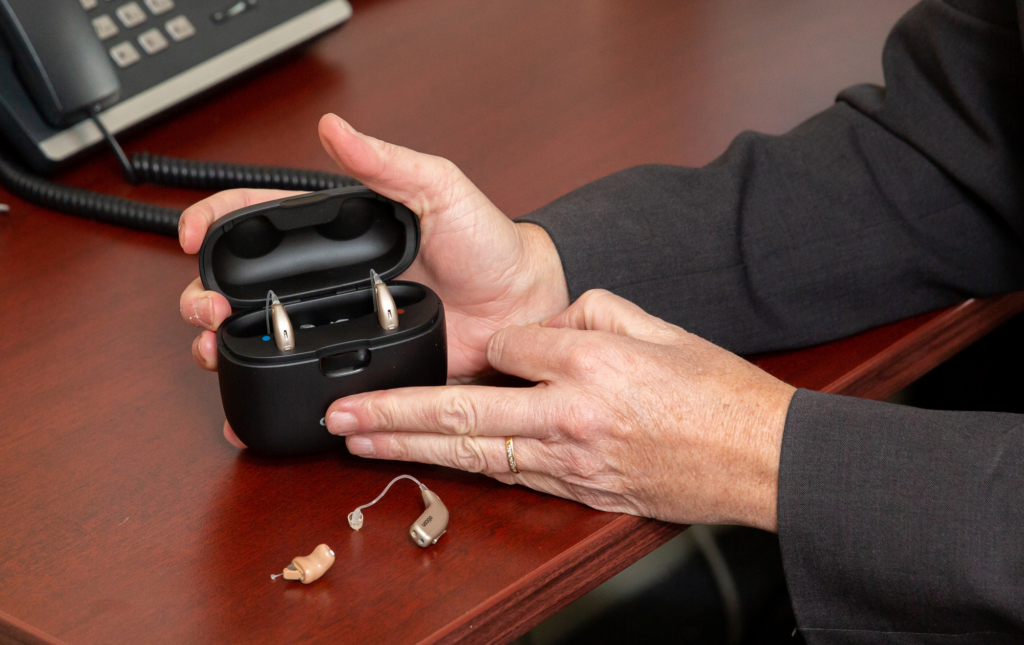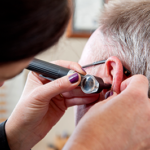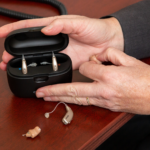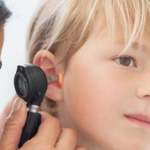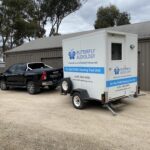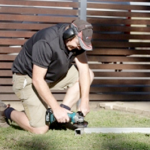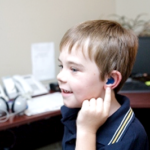Choosing the best hearing aid for you
People often come to us and say they want ‘the best’ hearing aid. So, what is the best hearing aid? Unfortunately, there is no single ‘best’ hearing aid to suit everybody. The hearing aid that is best for you may not be best for the next person.
Things like your type and level of hearing loss, lifestyle, budget, cosmetic preferences and dexterity help to determine which hearing aid is best for you.
Hearing aids can sit fully ‘In-the-Ear’ or ‘Behind-the-Ear (with a piece that also sits in the ear).’ There is a big range in the cost of hearing aids which is determined mainly by the type of processing chip (or little computer) that is inside the hearing aid. More sophisticated processing chips have technology inside them to help more in noisy situations compared to basic processing chips.
Most current hearing aids (including ones with basic technology and aside from the tiniest ones), have Bluetooth technology inside them that allows them to connect wirelessly to things like your mobile phone and television.
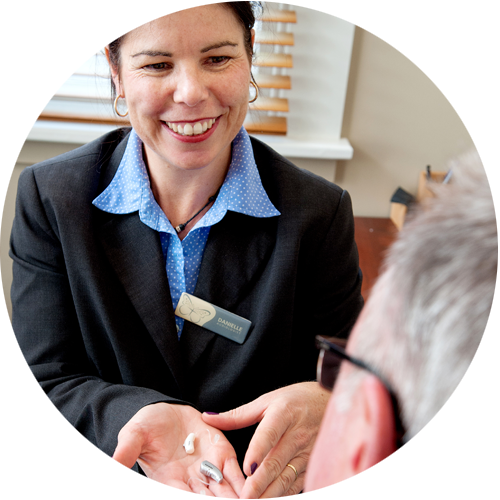
Being a truly independent clinic means we are not tied to fitting hearing aids from one manufacturer and can choose the best hearing aid for each individual. We work with all the world’s leading manufacturers including Oticon, Signia and Phonak among others. Hearing aid technology changes rapidly. We place a high priority on keeping our Audiologists up to date with the latest technology in hearing aids to deliver the best possible hearing aid fittings.
All our recommendations are driven by achieving the best outcome for each client and our Audiologists do not receive any commissions for fitting hearing aids.
Go to What’s New in Hearing Aids to read about the latest developments in hearing aid technology and see below for answers to the most FAQ’s about hearing aids.
Hearing Aid Fittings
Fitting your hearing aids takes approximately 1 hours and involves:
Checking the physical fit of the aids in your ears.
Programming the aids using a special method called ‘Live Speech Mapping’ where speech is played through a speaker and the output of the hearing aids is matched to a target which is determined by the hearing levels measured at your hearing assessment.
Checking that loud sounds will not be uncomfortable for you when wearing your hearing aids.
Showing you how to put your aids in and how to look after them.
Discussing how to get used to all the sounds you will hear around you with your hearing aids.
Counselling you about the realistic benefits you can expect the hearing aids to provide and other strategies you can use to further assist communication.
Answering any other questions or concerns you have about your new hearing aids.
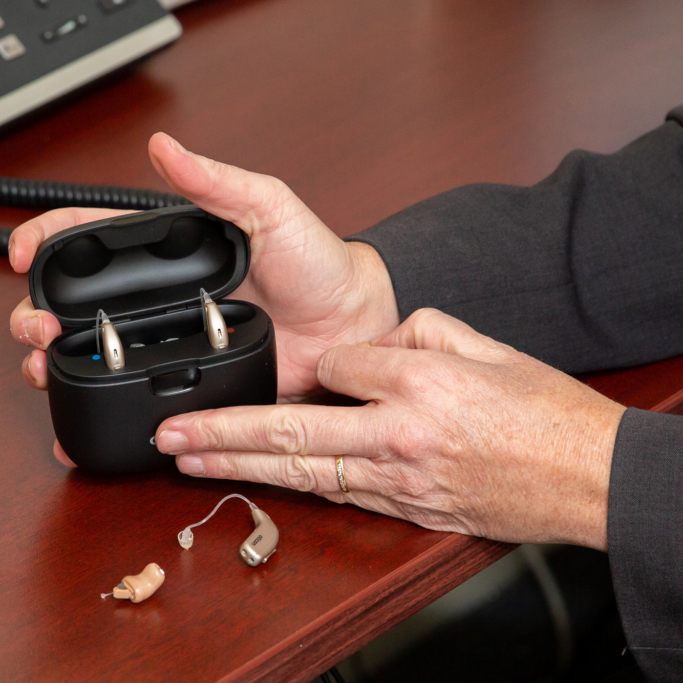
At the conclusion of your fitting appointment, a follow-up is organised about 2 weeks later so we can check your progress.
Nothing can replace normal hearing, even the top of the range, latest hearing aid technology. However, hearing aids can dramatically improve your hearing. For most people, when you first get a hearing aid, you will be amazed by all the sounds you can hear. It usually takes some time for your brain to adjust to hearing so many sounds, and to learn to filter out unwanted sounds. The main thing you can do to get the most out of your hearing aids is to wear them consistently. It is also very important to work with your Audiologist so they can answer your questions and optimise your hearing aid settings.
When you get hearing aids for the first time, you will hear a lot more sound. This includes hearing people’s voices much more clearly but also sounds that you do not necessarily want to hear (eg. your own footsteps, traffic noise, chewing). It can take up to twelve months of consistent use of your hearing aids to learn how to filter out unwanted sounds and focus on what you want to hear. Depending on your hearing loss and auditory processing abilities, it is often still difficult to hear clearly in noisy situations. Your hearing aids will help, but they won’t make it perfect.
At your initial hearing assessment your Audiologist will take a lot of time to discuss your individual hearing needs. What are the main situations you want to hear better in? Do you often go out to noisy environments like restaurants? Do you have trouble hearing the television? Is hearing on the phone a problem for you? Do you want to be able stream sound from your smart phone or computer? This information then allows the Audiologist to recommend which level of hearing aid technology is best suited to your needs. The Audiologist will also work out with you what style of hearing aid you are best able to manage, what suits your budget and what is cosmetically acceptable to you.
There is no such thing as one ‘best’ hearing aid for everyone – what is best for each individual depends on many factors such as your level and type of hearing loss, your communication goals, your ear anatomy, your management ability and your auditory processing ability.
After your initial hearing aid fitting, we recommend at least one follow-up appointment to ensure the hearing aid settings are optimised, you are managing your hearing aids and they are meeting your needs. For private clients, the initial fee you pay for your hearing aids and fitting include all follow-up appointments, batteries, consumables and servicing/cleaning of the hearing aids for the first year.
After this, we recommend an annual appointment to check your hearing and adjust your hearing aid settings for any changes. For private clients, we offer a yearly membership which includes your annual hearing and hearing aid review, trouble-shooting appointments throughout the year, replacement ear moulds, 12 months supplies of batteries and other consumables (domes, wax filters, etc.), hearing aid cleaning servicing and repairs, and loan service if your hearing aid needs to be sent away for repair. If you do not decide to take out a membership, all of the above are available on a fee-for-service basis after the first year. Please speak to one of our friendly staff to find out more. The Hearing Services Program covers the cost of appointments for Pensioners/DVA Cardholders.
The usual lifetime of all hearing aids is approximately 5 years. Like all electronic devices (hearing aids are like tiny computers), hearing aids are suspect to moisture damage and wear and tear. The lifetime is the same for basic hearing aids up to top of the range devices.
There is a wide range in the cost of hearing aids. Government funding is available for: Pensioners, DVA Cardholders, NDIS Participants and WorkCover Claimants. Some Private Health Insurance will cover a portion of the cost of hearing aids depending on your level of cover. Children under 26 years are fully funded for hearing aids.
For people who do not have access to any government funding, hearing aids range in cost from $2699 to $7600 for a pair (this includes the devices themselves and the fitting fee). There are accessories that can be used with your hearing aids (such as Bluetooth TV Adapters) that can be purchased at an additional cost.
Your actual hearing levels will deteriorate at the same rate regardless of whether you have hearing aids. What is interesting is that by wearing hearing aids, you are stimulating the hearing pathways in your ears and brain which helps to keep the pathways healthy and keep speech clear in quiet and in noise. Because of this it is better to get hearing aids as soon as you need them. We also now know that treating hearing loss early may delay the onset of dementia. So, wearing hearing aids is good for your ears and brain.
It depends on the individual person, including how much wax you produce when wearing your hearing aids. If you notice the sound is quieter than usual, intermittent or there is no sound when the aid has been fully charged/has a new battery, change the wax guard.
We allow 1hr for adult assessments and 45mins for children's assessments.
Unfortunately Medicare does not cover hearing aids. However, Government funding is available for: Pensioners, DVA Cardholders, NDIS Participants and WorkCover Claimants.
For Private clients, often Private Health Insurance will cover a portion of the cost of hearing aids - it depends on the fund you are in and your level of cover. You should contact you Private Health Insurance Company to find out if they will contribute towards the cost of your hearing aids.
Unfortunately no.
Hearing aids are not waterproof; however, they are water resistant. Despite this, we recommend that you minimise moisture exposure (eg. do not leave your hearing aids in the bathroom) as like anything electronic, this can damage the device.
After your Audiologist has tested your hearing and discussed your hearing needs, they will advise you if hearing aids are recommended. It is up to you to decide if you would like to proceed with them.
When making this decision, you should keep in mind that:
- Getting hearing aids early helps to keep your relationships with your friends and family healthy.
- Getting hearing aids early helps you to stay involved in the community.
- Getting hearing aids early can help you to avoid depression and loneliness.
- Getting hearing aids early helps to keep speech clear in quiet and noisy situations.
- Getting hearing aids early helps to keep your brain healthy and can delay the onset of dementia.
Do you really need hearing aids? You decide.
We recommend that you wear your hearing aids all the time when you get them, even when you are home alone. Even though you are not talking with anybody when you are home alone, there are still lots of environmental sounds going on - things like the kettle boiling, the microwave beeping, traffic outside, birds tweeting. By wearing your hearing aids in this situation, you are teaching your brain to tune out unwanted sounds around you and this then helps a lot when you are not home alone and when you go out into noisier situations
Hearing Aid Articles
I’d like some Bluetooth hearing aids. What are they by the way?
By Danielle Bowles Manager/Senior Audiologist
What is Bluetooth? Bluetooth is a way of communicating information from one compatible device to another. It uses ‘short-range wireless technology’ which means the communication is wireless (no cords). So, Bluetooth hearing aids are simply hearing aids that are able to communicate with other devices without the use of cords. The most common type of…
Hearing Aid Not Working?
By Danielle Bowles Manager/Senior Audiologist
Here are 5 of the most common reasons why your hearing aid may not be working and what you can do about it. It is blocked with ear wax It only takes a very small amount of wax to block a hearing aid. It is completely normal for our ears to produce ear wax, in…
What’s New in Hearing Aids?
By Danielle Bowles Manager/Senior Audiologist
Hearing aid technology changes rapidly. Below are some of the latest hearing aids we prescribe and fit in our clinic. Oticon Real The Oticon Real hearing aid family have been well received. Similar to Oticon’s previous OPN and More hearing aid technology, Real’s do not use traditional directional strategies in noisy environments to suppress unwanted…



